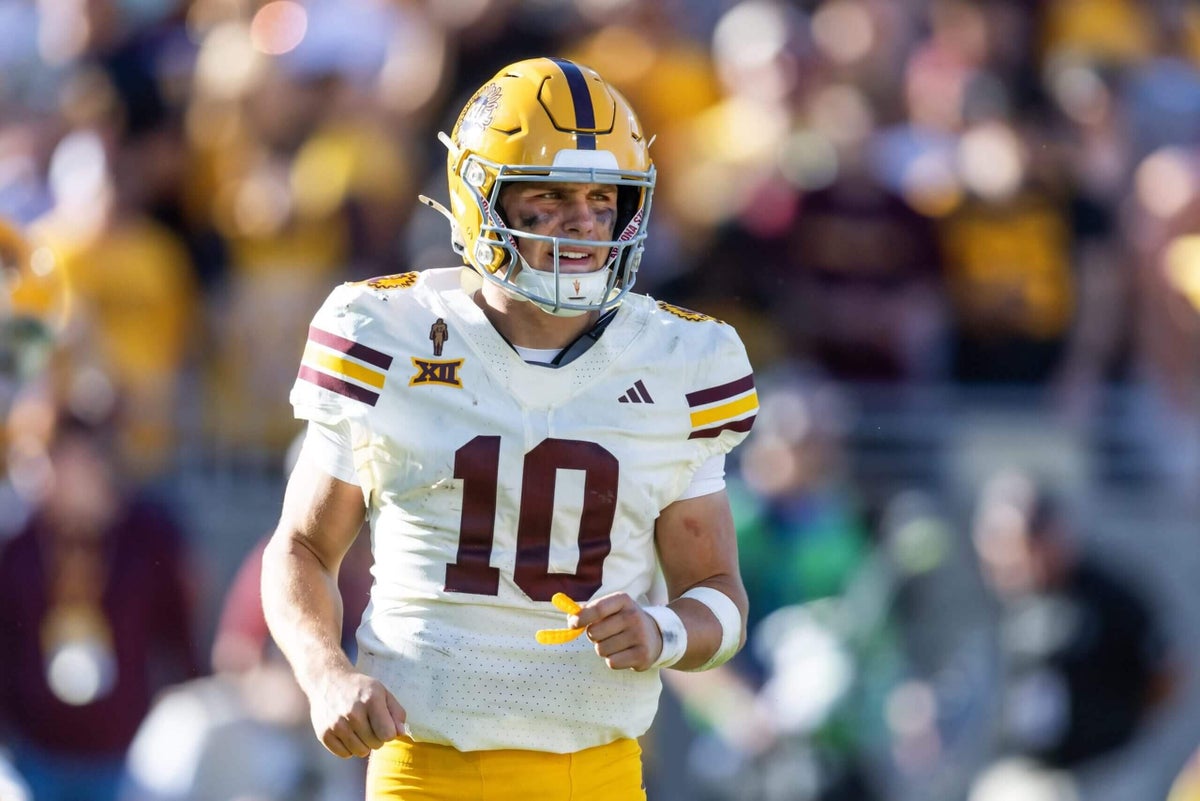By Sam Khan Jr., Antonio Morales and David Ubben
Arizona State quarterback Sam Leavitt, who led the Sun Devils to the College Football Playoff in 2024, is unlikely to return to the school in 2026 as he pursues lucrative offers from other programs to enter the transfer portal, a program source confirmed to The Athletic.
Leavitt’s camp is actively shopping the quarterback to other programs. He could command a deal with annual compensation exceeding $2 million if he enters the portal, the source said. On3 first reported that Leavitt’s camp was seeking interest from other programs “at a high level.”
The school source told The Athletic that Miami and Texas Tech are two potential destinations for Leavitt. Both have starting quarterbacks (Carson Beck and Behren Morton) who are in their final year of eligibility, and both have shown willingness in past cycles to spend big in the portal for players at positions of need.
A Texas Tech source denied to The Athletic that the school would be a potential landing spot for Leavitt. Will Hammond, a former four-star recruit who served as Morton’s backup the last two seasons before a recent knee injury cut his 2025 season short, is under a two-year revenue-sharing contract with the school and has been viewed as the heir apparent to Morton.
Leavitt’s father Jared denied that his son is entertaining leaving ASU.
“No, that isn’t true,” Jared Leavitt said in a text message to The Athletic.
Leavitt’s brother Dallin, who represents the quarterback, also seemed to deny the report by sharing a screenshot of a text exchange with an On3 reporter on Instagram. In the post, Dallin writes, “that’s not where things are right now … he’s still deciding what he wants to do.”
Sam Leavitt’s brother Dallin denies this report on his IG story: https://t.co/JKRA9FIK7G pic.twitter.com/wH8trp5c2l
— Blake Niemann (@Blakes_Take2) November 18, 2025
Leavitt’s potential move is to test the market and is not a sign that there is any rift between the quarterback and head coach Kenny Dillingham, a second program source said.
Last month, Leavitt was ruled out for the rest of Arizona State’s season with a foot injury that had been nagging him since late September. He was considered one of the top young quarterbacks in the country after leading Arizona State to the Big 12 championship and the Playoff in 2024. Leavitt threw for 2,885 yards, 24 touchdowns and six interceptions last season while rushing for 443 yards and five touchdowns.
This year, the third-year sophomore threw for 1,628 yards, 10 touchdowns and three interceptions and added 306 rushing yards and five touchdowns in seven games.
Leavitt, a former Michigan State transfer, can’t officially enter the transfer portal until Jan. 2. The NCAA last month moved the winter portal window back until the day after the CFP quarterfinal games. However, as the regular season winds to a close, players’ agents are already communicating with general managers and personnel staffers across the country to gauge interest and field offers, so that players can assess whether they should enter the portal when the time comes.
The portal is open for 15 days, closing on Jan. 16. There will be no spring transfer portal window this season, as that was eliminated as part of the change.
Leavitt could be one of the top players available this offseason if he enters the portal. A typical Power 4 starting quarterback can command compensation in the high six-figure to low seven-figure range, but a few top-end quarterbacks, like Beck and Duke’s Darian Mensah, have contracts that pay upward of $3 million per year. There are also a handful of quarterbacks this season making above $2 million per season.
Last week, Dillingham, while affirming that he is staying at the school amid potential interest from other jobs, said that Arizona State is “all-in” on providing the Sun Devils with the resources they need to win.
“We met … with our (administration) … and I have a lot of confidence that they’re all-in,” Dillingham said. “I have a lot of confidence that our administration is pushing the chips to the table on winning in football here. … This university is supporting football and doubling down on what we’re doing right now. That’s such a relief for me because I want to push this place to its limit.”
This season is the first where programs can directly compensate players as a result of the House v. NCAA settlement, which opened the door for revenue sharing. Programs are allowed to pay athletes across their athletic department a combined $20.5 million, and most Power 4 programs devote roughly 65 to 75 percent of that toward the football roster.
— Doug Haller contributed to this report.
